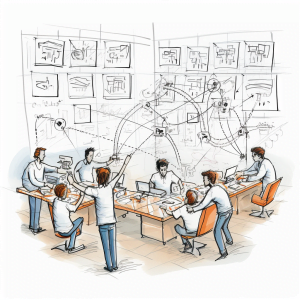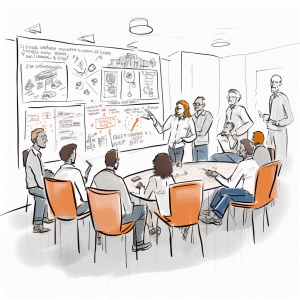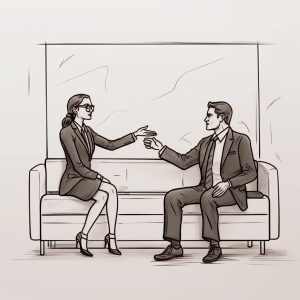It recently dawned on me that there’s a substantial amount of confusion still prevalent within certain industries. The effectiveness of coaching, the role of coaching, which many perceive as a soft and nebulous concept, is often challenged.
Recently, a conversation with an Agile Coach revealed that they frequently face questions like:
“The teams have established their work routines, rhythm of activities. That’s it, isn’t it? We no longer need an Agile Coach.”
The implication here is that once the working methodology is set, the Agile Coach’s job is done!
We:
- … took a moment to ponder why this sentiment persists and what it means for Agile Coaching in general.
- … drew parallels with roles such as leadership coaching, executive coaching, and business coaching.
- … imagined having a Rowing Coach who works with an Olympic team. Would they only be able to coach certain members, such as the 2 of rowers, only the rowers and not the support team? And what would the rowing coach be if they didn’t coach? A rower themselves?
We moved on to look at the common types of coaching in business: Executive, Leadership, Business and Agile.
Dissecting the roles: Two sides of the same coin

Let’s delve deeper into the roles aforementioned – Executive Coach, Leadership Coach, Business Coach, and Agile Coach. We will go into a more granular breakdown of these common types of coaching roles in business: Executive, Leadership, Business, and Agile.
The intention here is to dissect each role, looking at the individual components and their meanings. We will examine the significance of the first term (Executive, Leadership, Business, Agile) and the latter part (‘Coach’) separately, to gain a deeper understanding of what these roles imply in their entirety.
Executive Coaching:
- Executives denote individuals holding senior management or leadership roles within an organisation.
- Coaching is a mutual, introspective process that enables top-level individuals to achieve professional goals, enhancing leadership abilities. The coach fosters self-awareness, unlocks potential, and develops strategies for a broader impact within the organisation, all while promoting responsibility and progress.
Leadership Coaching:
- Leaders are those assuming the role of guiding and influencing others.
- Coaching is a reflective journey, empowering individuals seeking to improve their leadership skills. The coach facilitates self-awareness, explores alternative paths, and develops strategies for better leadership efficacy, all while fostering initiative and proactive strides.
Business Coaching:
- Businesses are organised efforts to produce, exchange, or sell goods and services for profit. It encompasses multiple activities such as operations, marketing, finance, and management.
- Coaching is a solution-focused venture empowering individuals or teams in a business context. The coach fosters awareness, explores possibilities, and helps devise strategies to maximise efficiency, all while promoting accountability and forward momentum.
Agile Coaching:
- Agile is a set of methodologies and practices for getting knowledge work done, e.g., project management and product development, focusing on flexibility, collaboration, and iterative progress.
- Coaching is a cooperative and inquiry-based process empowering individuals or teams to reach their goals and enhance performance. The coach facilitates active listening, meaningful questioning, feedback, and self-discovery to unlock potential and foster growth, all while encouraging responsibility and action.

In Agile Coaching, there are many specialisms. Let’s look at two common ones:
Agile Team Coaching:
- An Agile Team consists of individuals working together towards a common goal, typically organised around a product, feature, or project.
- Team Coaching is an interactive process where the coach helps the team become agile and work together to deliver value, focusing on improving team dynamics, enhancing collaboration and helping them meet objectives in an agile manner.
Agile Enterprise Coaching:
- Agile Enterprise is an approach to scale agile across a large organisation, involving the use of tailored frameworks such as Scrum and Kanban.
- Enterprise Coaching supports organisational agility by helping business leaders understand, integrate, and apply agile values, principles, and processes. The coach focuses on creating an environment that encourages self-organisation and fosters collaboration among teams, departments, functions, and so on.
While these descriptions are not exhaustive, it’s apparent that coaches do far more than just define ways of working—they help leaders and organisations build capabilities. They are agents of change, aiding individuals and teams in their growth and evolution towards goal achievement. In summary, coaching plays a crucial role within any organisation, regardless of the industry or sector. It can act as a catalyst for success and transformation!
Coaching necessitates a profound understanding of people, and it aims to foster an environment valuing learning and growth, enabling individuals and teams to reach their full potential.
Yet, this exercise does prompt further questions:
- Would a business hire for one of these roles only to allow the person to perform the initial part and not the actual coaching?
- If they didn’t want the coach to coach, wouldn’t it be more prudent to hire an Executive, Leader, Business Professional, or Agile Practitioner?

References and Further Reading:
- Adkins, Lyssa. “Coaching Agile Teams: A Companion for ScrumMasters, Agile Coaches, and Project Managers in Transition”. This book is an invaluable resource for those interested in understanding the intricacies of Agile coaching.
- Kimsey-House, Henry, et al. “Co-Active Coaching: Changing Business, Transforming Lives”. This book provides a comprehensive overview of coaching in a business setting.
- Goldsmith, Marshall. “Triggers: Creating Behavior That Lasts–Becoming the Person You Want to Be”. Highly recommended for those looking to delve into the psychological aspects of coaching and behavioural change.
For those ready to continue their venture into the world of Agile Coaching, we recommend the following resources:
- “Scrum Alliance”: Offers numerous resources, training, and certification opportunities for those interested in Scrum and Agile practices.
- “International Coach Federation”: A leading global organisation dedicated to advancing the coaching profession by setting high standards and providing independent certification.
Understanding the Role of a Coach
What a coach should not do?
A coach should not dictate or impose their own ideas onto the coachee. They should not solve problems for the coachee, provide unsolicited advice, or ignore the individual’s unique strengths and experience. A coach’s role is to guide and facilitate, rather than direct and control.
What are the five rules of coaching?
- Build Trust: Create a safe and confidential environment for the coachee.
- Listen Actively: Understand the coachee’s perspective and wait for them to complete their thoughts before responding.
- Ask Powerful Questions: Encourage introspection and exploration of new possibilities.
- Provide Constructive Feedback: Foster awareness, growth and promote the coachee’s self-efficacy.
- Encourage Action: Empower the coachee to take ownership and make strides towards their goals.
What is coaching and what is not coaching?
Coaching is a collaborative, solution-focused, and outcome-oriented process that facilitates self-discovery, development, and transformation. It is not mentoring, counselling, teaching, or consulting, which involve the transfer of knowledge, advice, or therapeutic intervention.
What are the unique golden rules a coach should keep in mind while coaching?
A coach should always remember:
- The Coachee Is the Expert: Respect the coachee’s unique skills, experiences, and insights.
- Promote Self-Discovery: Facilitate the coachee in finding their own solutions and strategies.
- Maintain Confidentiality: Ensure the coachee’s privacy and trust.
- Practice Empathy: Understand and validate the coachee’s feelings and perspective.
- Encourage Accountability: Foster the coachee’s ownership and commitment towards their goals.





0 Comments